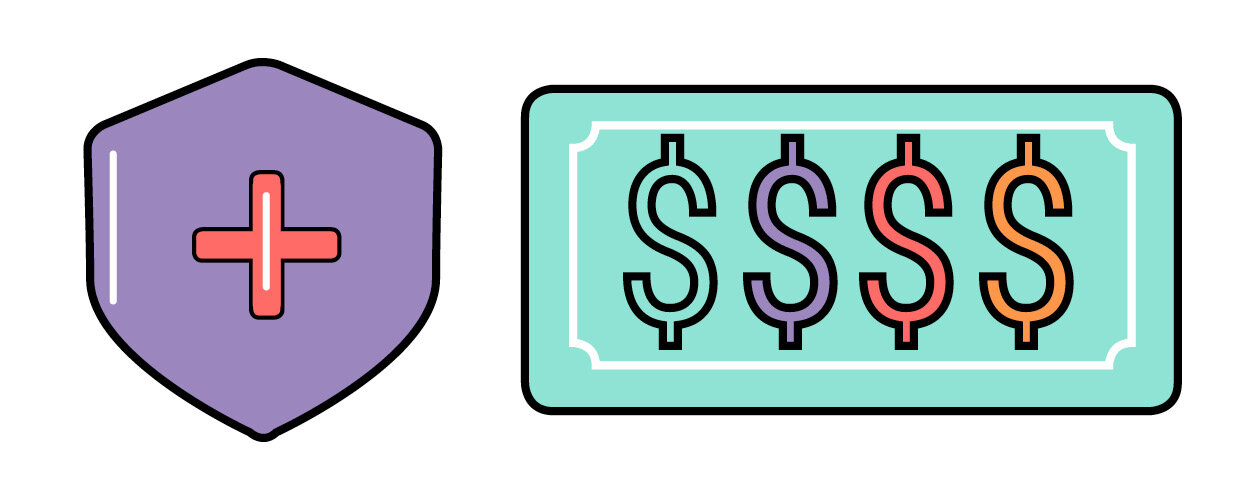As you know, health insurance varies in price, coverage, networks, and more! One type of health insurance many people are enrolling in is a high deductible health plan (abbreviated as HDHP and sometimes -mistakenly- called an HSA plan).
Not sure what it is or if it’s the right type of plan for you? No worries! We broke down the basics so you can decide for yourself!
What is a High Deductible Health Plan (HDHP)?
A High Deductible Health Plan (HDHP) is a type of health insurance plan that is designed to give the consumer lower fixed monthly premiums in exchange for being responsible for higher out-of-pocket costs if you do engage in healthcare services.
Still confused? No worries, we broke it down in an example below.
Example of a High Deductible Health Plan vs a Standard PPO Plan
Anna has to go to the doctor for a specialist (dermatologist, endocrinologist, etc.) visit. Below is how the cost plays out for a standard PPO plan with copays versus a standard HDHP, where most services apply to the deductible.
Standard PPO Plan: Anna pays a $45 specialist copay.
Standard High Deductible Health Plan: Anna pays the “contracted rate” for the visit, usually between $80-$250 for a specialist.
Why would anyone choose a High Deducible Health Plan (HDHP) when it appears to cost more?!
People sometimes choose High Deductible Health Plans (HDHPs) because the premiums, the fixed cost that you pay every month just to have your insurance plan, are often much lower on high deductible plans. Let’s look at the same example, but add premiums.
Standard PPO Plan: Anna pays:
Her monthly premium (whether she uses 0 healthcare services or 100) of $400 + The $45 specialist copay
= Total monthly cost for healthcare: $400 + $45 = $445
Standard High Deductible Health Plan: Anna pays:
Her monthly premium (whether she uses 0 healthcare services or 100) of $150 + The “contracted rate” for the visit, usually between $80-$250 for a specialist, so an average of $170
= Total monthly cost for healthcare: $150 + $170 = $320
If this is the only healthcare service Anna needs, she saves money by using the HDHP because her premiums (fixed costs) are so much lower than the premiums on the PPO plan.
If Anna is the type of person who never goes to the doctor and rarely uses health services (other than preventive services, like an annual physical), she could save thousands each year by choosing a HDHP.
Still confused? Think about a homeowner or car insurance policy. They give you the option of paying higher premiums for lower deductibles, or lower premiums for higher deductibles. Whether it is car, home, or health insurance, you and the insurer are playing with risk. How likely is it that assuming less of the cost now (in fixed monthly premiums) will still be cheaper IF there is a claim?
The good news about health insurance versus car or home is that most people can take an educated guess at their expected health utilization. If you have an ongoing health condition that requires prescriptions and consistent lab work or doctor visits, you can anticipate the number of visits and tests given previous years utilization. Using your estimates and the information below, you can see which type of health insurance plan might be best for you!
Should I enroll in a High Deductible Health Plan (HDHP) or a PPO plan?
You might want to consider a HDHP if…
Your monthly healthcare utilization is low, i.e. you mainly just take advantage of preventive care, 100% covered prescriptions (such as birth control) or just an occasional doctor visit. If so, a HDHP might be right for you! This is because you will pay low fixed costs and very few services will likely be applied to your deductible.
Your overall healthcare utilization is so high that you anticipate meeting your out-of-pocket maximum (OOP Max). Once you meet your out-of-pocket maximum, all in-network, medically necessary services are covered at 100%, so you won’t have costs beyond that point. If you anticipate meeting your OOP Max, you can determine the total cost of your care by adding the annual cost of premiums plus the cost of your OOP max.
Note: If your deductible is not included in your OOP max, you’ll want to add that to the equation as well. Consult your summary of benefits for details.
If you do enroll in a HDHP, also enroll in the Health Savings Account for tax savings!
You might want to go with a PPO plan if…
Your healthcare utilization is medium i.e. you use enough to meet your deductible and some coinsurance. If so, you will likely spend less money overall on a PPO plan. Just make sure to stay in-network!
You don’t have enough money saved in an emergency fund to cover unexpected medical costs.
Thinking about enrolling in a High Deductible Health Plan (HDHP)?
Read the articles below to learn how to make the most of it.
Note: Choosing the optimal health insurance plans varies based on individual healthcare needs and specific plan details. We recommend reviewing your summary of benefits to get a full understanding of how healthcare costs work for your specific situation.

